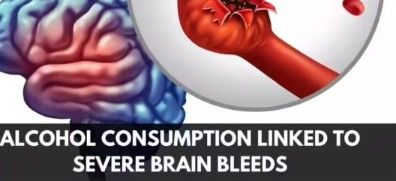
A few drinks might seem harmless to many—an easy way to unwind after a long day. But while the buzz fades overnight, the damage may not. Alcohol consumption leads to 2.6 million deaths each year globally, according to the World Health Organization (WHO). While the adverse effects of alcohol start from the first drop, excessive drinking can lead to a brain bleed. What’s more striking is that the ‘excessive’ limit is far lower than most people assume.A new study by investigators from Mass General Brigham suggests that excessive alcohol consumption may lead to more severe brain bleeds and cause long-term brain damage at a younger age. The findings of the study were published in Neurologythe medical journal of the American Academy of Neurology.
Excessive alcohol consumption linked to brain bleeds
The new study found that alcohol consumption, especially in excess, may damage brain vessels—and the effect is long-term—due to severe brain bleeds. The research is based on patients treated for brain bleeds at Massachusetts General Hospital.“The brain bleed is one of the most lethal and disabling conditions known to human beings. They come on suddenly, cause severe damage, and often leave patients with life-changing disabilities. It’s one of the most difficult conditions to recover from,” said corresponding author Edip Gurol, MD, a clinician investigator in the Mass General Brigham Department of Neurology.
What is a brain bleed?
A brain bleed, also called an intracerebral haemorrhage or haemorrhagic stroke, occurs when a blood vessel inside the brain bursts, according to the NIH. About 50% of people with this condition die, and 30% are severely disabled, the researchers noted. Gurol added that only 20% of people who sustain a brain bleed can take care of themselves independently a full year later.To understand the effects of excessive alcohol consumption on brain bleeds, the researchers used a cohort of 1,600 patients admitted between 2003 and 2019 to Massachusetts General Hospital. These patients had a brain bleed that was not the result of an injury or trauma. Using CT scans, the researchers assessed the size and location of the brain bleed. MRI scans confirmed signs of damage to the brain’s small blood vessels.
What they found
The researchers found that about 7% of the brain bleed patients reported consuming three or more drinks a day. They discovered that people who drank heavily were younger when the brain bleed occurred (average age 64 versus 75) compared to those who didn’t. Their brain bleeds were 70% larger. These patients were also twice as likely to have a bleed deep inside the brain or one that spread into the brain’s fluid-filled spaces.The study showed that even lower alcohol intake—two drinks per day—was linked to a younger age of onset of a brain bleed. The adverse effects of alcohol intake do not end there. Those who consumed alcohol in excess had lower platelet counts (cell fragments that help blood clot) and higher blood pressure when they arrived at the hospital. These patients also had damage to the tiny blood vessels in the brain, which is linked to dementia, memory loss, and walking problems. It is also a major risk factor for brain bleeds.
How to prevent a brain bleed
The researchers proposed the hypothesis that heavy alcohol consumption raises blood pressure, damaging the small blood vessels in the brain, making them weak and more likely to leak or burst. When platelet counts are low, it becomes harder for the body to stop bleeding. Together, these factors can significantly increase the risk of a brain bleed.How to prevent it? Drink less, the researchers said.
Representative image
“We now know that heavy drinking leads to larger, earlier brain bleeds. Minimising or stopping alcohol use is an important step to lower that risk. Even for people at relatively low risk of brain bleeding, limiting alcohol consumption to no more than three drinks per week may be an effective measure to protect against all types of stroke and to preserve both brain and cardiovascular health,” Gurol said.Note: The information provided in this article is for educational purposes only and is not intended as medical advice. Always consult a qualified healthcare professional before starting any new medication or treatment, or before changing your diet or supplement regimen.
-
UP Home Guard Bharti 2025: Guidelines issued for recruitment of over 45,000 Home Guards in UP, even 10th pass candidates can apply..

-
PNB LBO Recruitment 2025: Recruitment for 750 posts in Punjab National Bank, salary up to Rs 85,920, know who can apply..

-
NABARD Recruitment 2025: Government job opportunity in NABARD, application process will start from November 8..

-
Apprentice: Do apprenticeship with Haryana Roadways, know who can apply..

-
Indian Army Recruitment 2025: Opportunity to become an engineer in the Indian Army, last date to apply is today, apply immediately..
